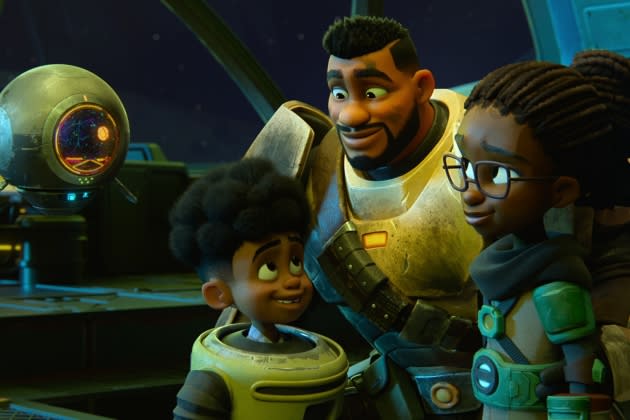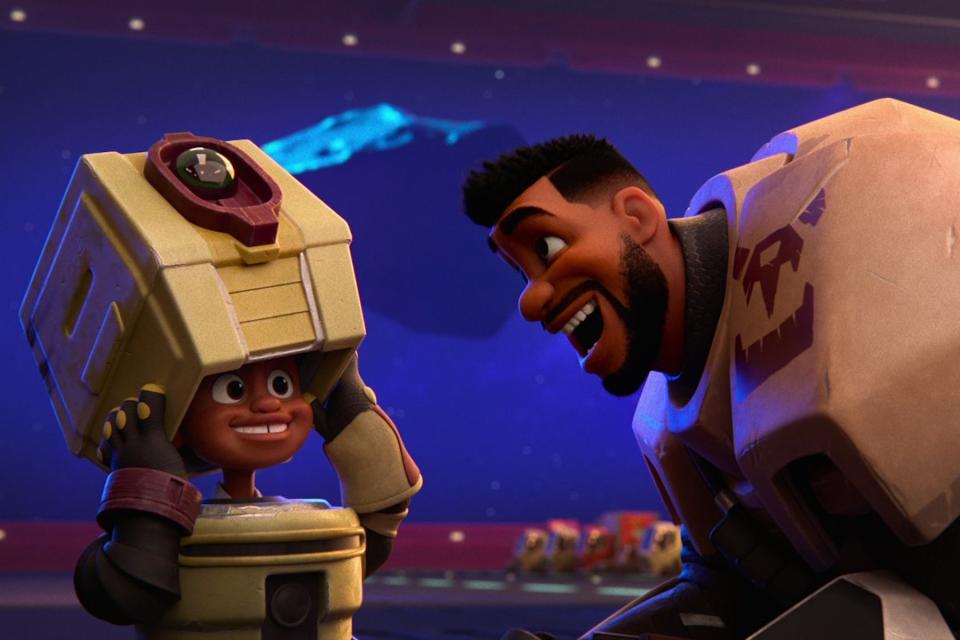Netflix’s ‘My Dad the Bounty Hunter’ Is an Afrofuturist Marvel
- Oops!Something went wrong.Please try again later.
- Oops!Something went wrong.Please try again later.

From Beyoncé’s Black Is King and the Hulu adaptation of Octavia Butler’s Kindred to the Black Panther films, Black science fiction — what scholars have coined Black Speculative Thought or Afrofuturism — has seen a steady rise over the past few decades. The latest entry, Netflix’s new animated series My Dad the Bounty Hunter, now streaming, brings outer space and Black familyhood to the forefront, staying true to the genre’s core mission: telling relatable and futuristic stories that center Black characters while expanding the audience’s imagination.
“A lot of the inspiration for this show came out of the fact we never see [space] from a Black point of view,” co-creator Everett Downing Jr. tells Rolling Stone. “It’s a different perspective that people crave. As a kid, seeing Lando Calrissian [Billy Dee Williams] in Star Wars blew my mind. I was like, There’s a Black dude in space!’”
More from Rolling Stone
Reese Witherspoon and Ashton Kutcher Try to Revive the Romcom With Zero Chemistry
Penn Badgley Reveals How Taylor Swift Inspired Him to Be TikTok Famous
Season one of the 10-episode series follows the life of Terry (Laz Alonso), a father who is navigating the battles of marital separation from his wife Tess (Insecure’s Yvonne Orji) and co-parenting their two strong-minded children, while also capturing and battling aliens who are trying to invade other space colonies. When his kids Sean (Jecobi Swain) and Lisa (Priah Ferguson) hitch a ride with him on his latest mission, things get complicated. And they discover that their Terry is actually Sabo Brok, an intergalactic bounty hunter.
“Everett was literally talking about not spending enough time with his kids because we were working and we were like, hey, let’s work that into something sci-fi,” says co-creator Patrick Harpin.
Downing and Harpin met while working on the 2017 Emoji Movie. After numerous conversations about projects they didn’t feel passionate about and the types of movies that people weren’t making that they wanted to see, the two embarked on their next endeavor.
“We basically hatched this [series] as a way to cope and make something that we wanted to work on every day,” says Harpin. “We talked about Black sci-fi and [movies] like The Brother from Another Planet and Attack the Block, which was huge and so good and smart, and we took it from there and built on the world of My Dad the Bounty Hunter.”

That the series is dropping during Black History Month is seen as “perfect timing” by Downing and Harpin. After all, when looking at the philosophy of Black science fiction and its layers of possibility, history, philosophy and spirituality, the roots of this rich genre extend back to the 1800s and beyond.
Black people have been underrepresented in numerous areas (if represented at all), and the realm of sci-fi is no different. But Black sci-fi has persisted. It can be seen in the work of artists and thinkers like Sun Ra, George Clinton and Parliament Funkadelic. Or freeman Martin Delany’s 1859 novel Blake; or the Huts of America, which tells the story of a slave rebellion and served as an impassioned response to the Fugitive Slave Act of 1850.
“Delany’s Blake is a great starting place, but what about David Walker’s 1829 Appeal, or Benjamin Banneker’s 1791 ‘Letter to Thomas Jefferson,’ or Phillis Wheatley’s 1773 poem ‘On Being Brought from Africa to America?’” says Isiah Lavender III, a professor at University of Georgia, writer and researcher of African American literature and science fiction.
He continues: “There’s a variety of slave narratives that highlight the science-fictional Blackness that Black people have experienced in the New World. Africans taken from the West Coast of Africa are taken on alien ships by alien people and transported to an alien land, forced to speak alien languages, eat alien foods, and experience alien religions — that’s science-fictional Blackness. If you’re looking for an alien-invasion metaphor at the root of Afrofuturism, it has already happened on our own planet.”
Afrofuturism — a term coined by cultural critic Mark Dery in 1993 — is said to be a “wide-ranging social, political, and artistic movement that imagines a world where African- descended peoples and their cultures are central in the creation of future worlds,” according to UCLA. In an email to Rolling Stone, Dery says, “Afrofuturism isn’t an aesthetic. It’s a critical lens for looking at the stories America tells itself about where it’s come from and where it’s going. Its slogan, if it has one, is: ‘Another world is possible.’”
There are other names for this phenomenon that differ from each other but all strive to center Blackness and its future. You have Afrofuturism, Afrofuturism 2.0, coined by Reynaldo Anderson, Black Speculative Thought, coined by scholar John Jennings, African Futurism, coined by Pamela Phatsimo Sunstrum and Africanjujuism, coined by writer Nnedi Okorafor. Reynaldo Anderson, an associate professor of Africology and African American Studies at Temple University, hasn’t viewed My Dad the Bounty Hunter as of yet, but as a scholar and writer of the genre he wonders: “Where’s the agency of the Black characters in relation to themselves and others? How does their agency advance in the context of this show?”
“Afrofuturism is how people of African descent locate themselves in time and space with agency,” says Anderson. “Black Speculative Thought is different from science fiction because the Black Speculative Tradition, like Martin Delany, emerges as a response to white supremacy and scientific racism, imagining alternative worlds.”
In My Dad the Bounty Hunter, the creators place Terry and his family at the center of a battle for the future — of the larger world and his own. In his private world, he is fighting to create a work-life balance. Terry is facing a capitalistic system where his need to make money for his family’s survival is in direct conflict with his desire and need to show up as a devoted husband and father. Not only does this survival mode cause him to bypass his family, but it results in him being ignorant of the otherworldly oppression that his work contributes to. It isn’t until his brilliantly hard-headed children — the true heroes of the show — challenge his authority that Terry feels the need to push back against the system.
Like most stories, the inspiration for My Dad was rooted in the creators’ real-life experiences, observations, and, in true Black sci-fi fashion, what could be.
My Dad’s writer’s room — which is majority-Black — was intentional in their recruiting, even hiring the author of the 2018 fantasy bestseller Children of Blood and Bone, Tomi Adeyemi. It’s a big reason why the show boasts a positive narrative about a Black family where the characters’ Blackness is neither a plot point nor a topic of discussion. “[Everett and I] both love The Incredibles,” says Harpin. “But no one questions, ‘Why is the family white?’ That movie doesn’t have to answer that.”
What makes My Dad special is its ability to normalize Black heroism for future generations.
“I’m super excited about what’s coming,” says Downing, who lists upcoming projects from colleagues of his like the anticipated show Invincible Fight Girl, coming to Cartoon Network and HBO Max. “There’s a lot of really awesome voices that are starting to come out right now and when they hit, it’s going to hit differently, and the audience is going to feel it. It’s going to be revitalizing.”
Best of Rolling Stone

